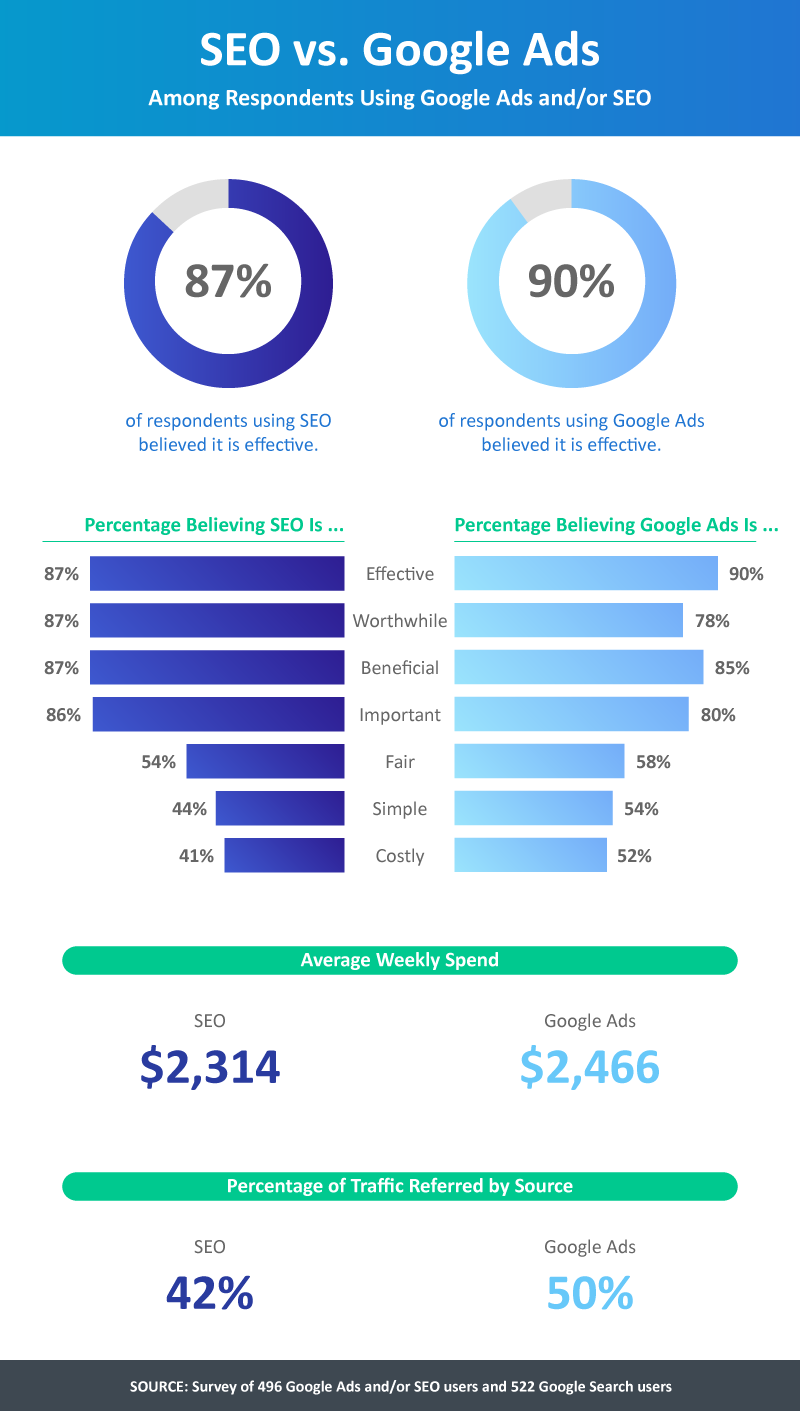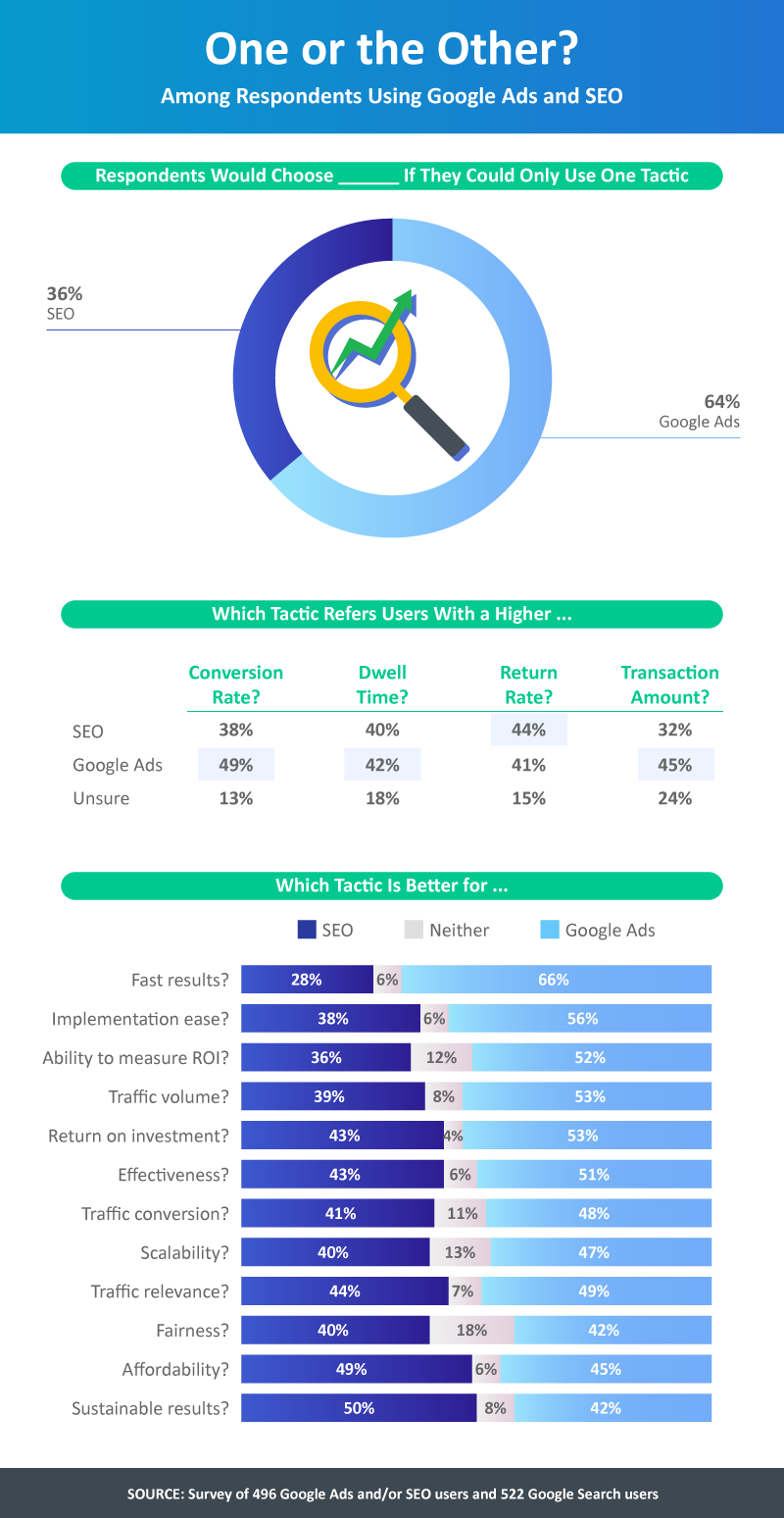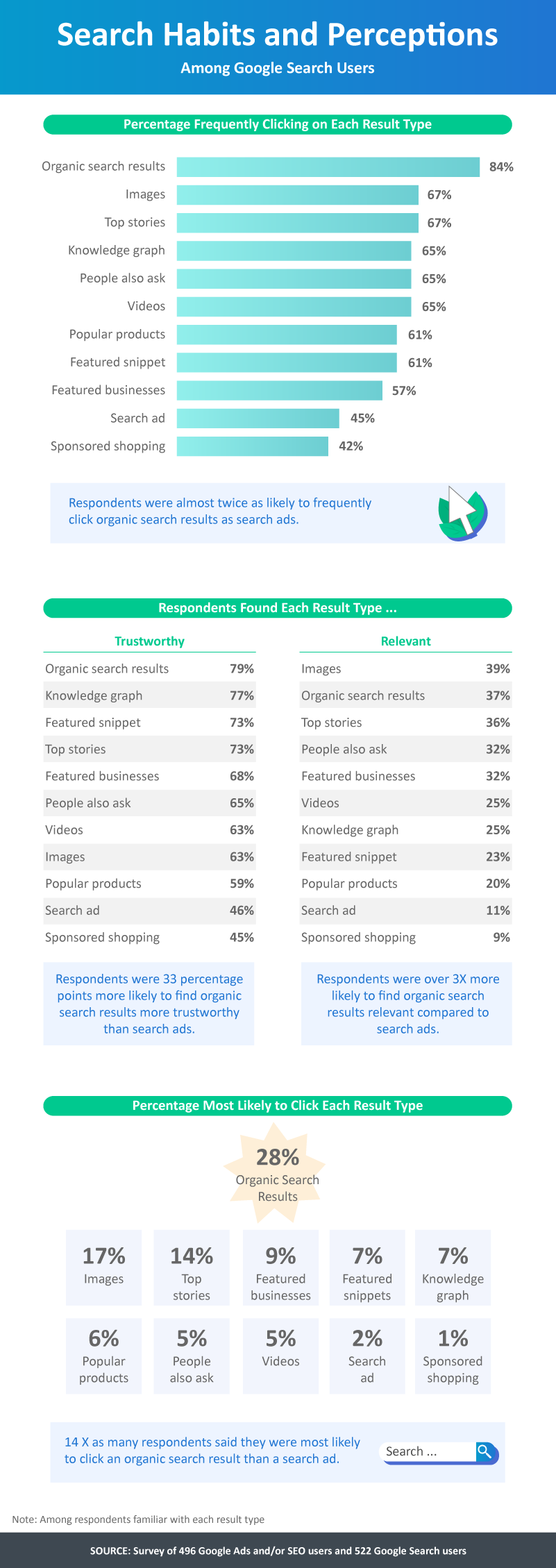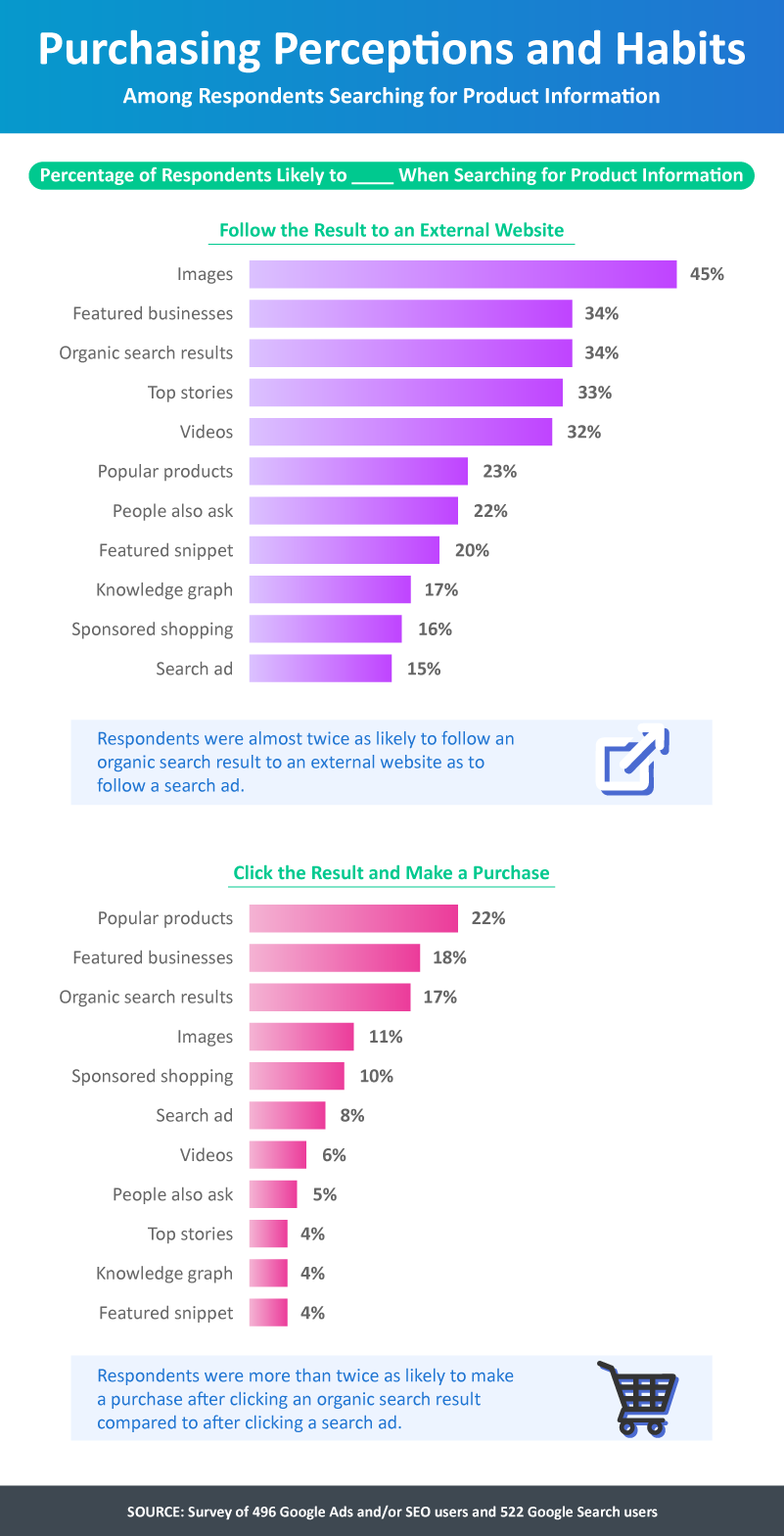A separate but thematically related survey found that only 30% of SMB owners had an SEO strategy.
During this time of marketing budget freezes and re-deployments, the question of which channels to use for greatest impact is top of mind for most marketers. Two surveys cast some light on the current thinking among marketing professionals and small business owners about the relative merits of SEO and PPC.
Paid search preferred. A survey by BestSEOCompanies.com, polled 1,000 marketing professionals and consumers (split almost evenly) and asked about the effectiveness of SEO vs. Google Ads according to several measures.
Marketers in roughly equal numbers found both SEM (90%) and SEO (87%) to be effective. Forced to choose one or the other, however, a surprising 64% said they would choose Google Ads, although SEO was seen as more affordable and sustainable than paid search.

This response comes despite the fact that SEO drives more referral traffic than paid search. Data from BrightEdge last year, for example, showed that organic search was responsible for 53% of site traffic while paid drove roughly 15%.
Consumers respond more to organic results. The survey asked consumers about the trustworthiness and relevance of different SERP features and their engagement with those features. It also asked consumers about their inclinations to click on organic results vs. paid ads. While 84% said they frequently click organic results, only 45% said the same of paid-search ads.
The survey thus reveals a gap of sorts between these marketer-respondents and consumers. The fact that the marketers preferred paid search to SEO, I suspect, has to do with the greater sense of control and trackability that paid search offers. A larger percentage said they could measure ROI with paid search (52%) vs. 36% who said they could track ROI from their SEO efforts.
SMBs’ missing SEO strategy. A separate survey of 500 small business owners from The Manifest found that “just 30% have an SEO strategy in place to improve their website’s organic ranking.” The majority of respondents (75%) were from firms with between two and 10 employees.
SEO is challenging and too complex for most true small business owners to manage themselves. However, the survey found that’s mostly what’s going on: 62% of businesses doing SEO are managing it in-house, with 77% of those working on SEO doing it only part-time.
Why we care. This SEO vs. PPC debate has been going on since the beginning of search marketing itself. The smart answer to the question of whether to do SEO or PPC is “and” not “or” — both tactics complement one another. (The BestSEOCompanies.com should not necessarily be extrapolated to the entire industry because of its methodology and relatively small sample size.)
However, as budgets are being squeezed and paused right now — especially in the case of SMBs — the SEO vs. PPC question takes on new importance and urgency. While many marketers reading this article would probably argue SEO is foundational and PPC is more discretionary, the ultimate answer is basically case-by-case.
Here is the survey:
The Pros’ Perspective
In this section, we’ll explore how professionals who use Google Ads and/or SEO methods view the value of each approach.
Assessing Advantages
When we asked professionals about each technique for attracting customers, their feedback was overwhelmingly positive. Indeed, the majority of respondents who had used each approach described them as constructive, adding credence to the belief of many marketing professionals that both tactics are complementary.

Of those who had employed SEO methods, 87% rated them effective; 90% of those who used Google Ads said the same. Respondents were more likely to regard SEO as “worthwhile,” “beneficial,” and “important,” although most Google Ads users also described the platform in these terms.
A greater percentage described Google Ads as “fair” and “simple,” which makes good sense given the ever-evolving (and often ambiguous) nature of SEO best practices. Google has long prioritized ease of use on its advertising platforms, including by recently streamlining its services into a single unified interface. On the other hand, respondents were significantly less likely to describe SEO as costly, and those who used Google Ads did tend to spend more cash on a weekly basis.
These findings suggest some of the major differences between these approaches. Google Ads offers straightforward and effective tools to purchase exposure to potential customers. SEO, while worthwhile and cost-effective in the long run, can be far more challenging to implement and assess.
Considering Contrasts
If most professionals viewed SEO and paid ads as effective approaches, what particular differences did they perceive between these techniques? Respondents who used both approaches voiced varied opinions about their respective advantages, connecting them to specific priorities.

When asked which platform they would choose if forced to select just one, nearly two-thirds chose Google Ads. This result could reflect the perceived advantages in the traffic that search ads generate. Respondents were significantly more likely to say that visitors referred by Google Ads converted at higher rates and completed larger transactions. Of course, this comparison is imperfect in many respects, leaving out key nuances. For example, search ads can be used to remarket to previous organic visitors who would naturally convert and spend at higher rates.
Once again, however, professionals extolled the ease and simplicity of Google Ads. Compared to SEO, most respondents said Google Ads was better for generating fast results, ease of implementation and measurement, and overall traffic volume. By contrast, SEO earned the upper hand in regards to longevity: More respondents thought SEO was the better option for sustainable results.
For experienced search marketers, these results will certainly resonate. Although SEO offers tremendous value over the long term, it’s hardly a straightforward or short-term investment. To reap the rewards of your SEO efforts, you’ll need the right team and the patience to let their work pay off.
Moreover, whereas paying for search ads is relatively simple, a one-size-fits-all approach to SEO can backfire. Is your company willing to seek the sustainable success that SEO affords, or will you rely on the simplicity of Google Ads instead?
How Searchers See It
In this section, we’ll explore how Google search engine users perceive and respond to search ads and organic results. By probing the opinions and habits of real users, we can gain new insights about how real audiences receive each approach.
Clicking Carefully
When individuals consider search results, do they critically evaluate their options before deciding where to click? Our findings certainly suggest they do, with users expressing varying degrees of trust in different kinds of results.

What explains this relative aversion to paid results and preference for organic ones? First, just 46% regarded search ads as trustworthy, compared to 79% who felt that organic results were. For many experts, this barrier is the primary challenge in paid search tactics: No matter how much exposure you pay for, it can be difficult to overcome searchers’ skepticism if they’re unfamiliar with your brand.
Additionally, just 11% of users said they found search ads to be relevant to their queries. This result is somewhat surprising, as Google claims to incentivize relevance as part of its “Quality Score” for search ad content. In the eyes of users, it seems, these measures hardly ensure search ads correspond to their intentions.
The Path to Purchasing
If searchers are more inclined to trust some kinds of results, how do these feelings shape users’ browsing and purchasing patterns? In terms of converting visibility to visitors and buyers, certain search results seem to have a significant edge.

Respondents were most likely to follow an image result to an external website, ostensibly to see the text accompanying intriguing photos. From there, respondents were most likely to follow organic search and featured business results to external sites, followed closely by top stories. At the other end of the spectrum, users were least likely to follow search ads to external websites, again indicating a deep deficit in trust.
In terms of clicking through and actually making a purchase, however, users were most likely to do so through Google’s “Popular Products” results. This section, a relatively new addition to search results, is intended to help the search giant compete with Amazon and other online retailers. Featured businesses and organic search results ranked second and third, respectively, whereas search ads were substantially less likely to lead to purchases when clicked.
Cumulatively, these findings should give professionals pause about the over-reliance on search ads alone. Although paid search tactics may seem simple and effective, it seems many customers dismiss or avoid them altogether.
Speed and Sustainability: Balanced Search Strategy
Our findings indicate considerable enthusiasm for both paid search ads and SEO methods, suggesting these techniques can complement each other in a comprehensive digital strategy. The majority of professionals who invested in SEO and Google Ads found these approaches effective, but typically in distinct ways.
Google Ads was associated with easy implementation, fast results, and simple ROI analysis. SEO, conversely, was seen as less costly and more sustainable. Moreover, real users seemed far more inclined to trust and click on organic search results and substantially more likely to make purchases via organic search returns. On the other hand, paid ad costs were tied to users’ clicks, making them seem like a relatively safe investment.
Here’s the good news: You don’t need to weigh these pros and cons alone. BestSEOCompanies.com can help you find the perfect partner for your digital marketing priorities. Whether you need an agency capable of coordinating your paid and organic efforts or a niche company with precise expertise, we’ll direct you to a team you can trust. Check out our resources today and see how we can help your site succeed.
Methodology
We surveyed 1,018 people using the Amazon Mechanical Turk service. To help ensure that respondents took our survey seriously, all respondents were required to identify and correctly answer an attention-check question. 496 respondents were regular users of Google Ads and/or SEO, and 522 were regular users of Google Search. Survey quotas were used to ensure a sufficient sample size of respondents were experienced in Google Ads and SEO.
In many cases, questions and responses were rephrased for clarity or brevity. These data rely on self-reporting, and strict statistical testing was not performed on these findings. Potential issues with self-reported data include, but are not limited to, exaggeration, selective memory, and attribution errors on the part of respondents.
Fair Use Statement
Whether you’re a seasoned digital marketing expert or a first-time entrepreneur, we hope you’ve found our results compelling. Better yet, we hope you’ll share our project with any friends or colleagues who might find it interesting, as well. In that spirit, feel free to use our images and information for any noncommercial purpose. If you do, we kindly ask that you link back to this page to attribute our team appropriately.




